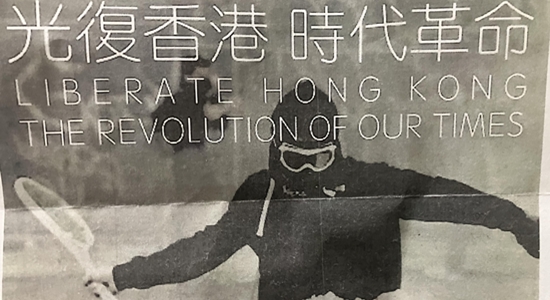
In the United States, a child can be suspended from school for wearing a T-shirt saying that there are only two sexes, promoting the right to bear arms and the NRA, or bearing an image of the American flag.
The rights and wrongs of such expressions and penalties are sometimes adjudicated in court. Over the years there have been many other silly stories about “zero-tolerance” policies in American schools. On occasion a rule-flouting student has been arrested and even handcuffed for no very good reason. If, however, any students have been sent to prison for displaying sentiments that are anathema to the educrats, search engines don’t know about it.
And in the real world outside of the schools, the worst that may happen as a result of wearing an ideologically emblazoned T-shirt is getting fired; perhaps you may also get beaten up if you venture into the wrong neighborhood with the wrong slogan. But nobody is getting prison sentences just for wearing heretical T-shirts. We’re not quite there yet.
Liberate Hong Kong
The situation is different in more oppressive regimes, including that of post-2020, post-2023 Hong Kong. If a Hongkonger displays a slogan construed as rebelling against authority, he can now be incarcerated for up to ten years. This maximum sentence is a provision of what some reporters call a homegrown expansion of the National Security Law that China imposed on Hong Kong in 2020 (“homegrown” because nominally the work of the Hong Kong government).
Hong Kong man Chu Kai-pong was recently sentenced to 14 months for exhibiting slogans on his person deemed seditious. His T-shirt said “Liberate Hong Kong, revolution of our times.” His mask said “FDNOL,” which means “Five demands, not one less.” This slogan of the 2019 protesters refers to their demands for freedom and democracy, political goods once largely enjoyed in Hong Kong and which the Chinese government has worked to crush (Republic World, September 24, 2024).
In court, it was revealed that Chu was also carrying a box containing his excrement, intended as a provocative gesture against those opposed to his views. He had previously served three months in jail for wearing a similar T-shirt and possessing offensive items.
Chief Magistrate Victor So emphasized that Chu intended to “reignite the ideas behind” the protests and noted his lack of remorse after a previous conviction. The maximum penalty under the new law for such offenses is 10 years in prison.
Having displayed slogans of protest and “possessed offensive items” before, Chu is getting a longer term behind bars this time around. If after serving the 14 months he commits a third offense, which seems very possible, he would likely be sentenced to an even longer term. Whoever is the judge in that future case will say, like Victor So, that Chu continues to lack remorse for opposing tyranny.
Hong Kong Free Press reports that Chu is one of three Hongkongers recently punished for sedition under the new security law. The others are Au Kin-wai, also sentenced to 14 months in prison, and Chung Man-kit, sentenced to 10 months.





